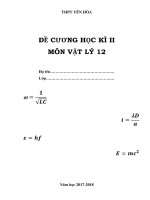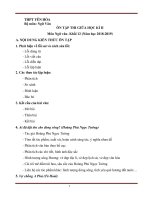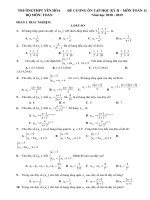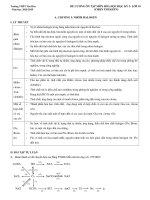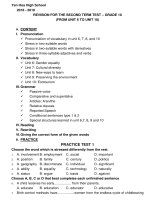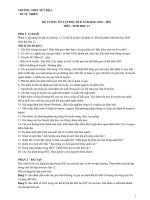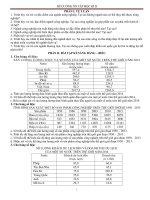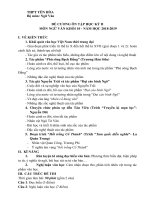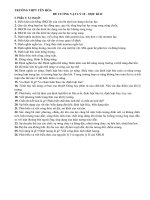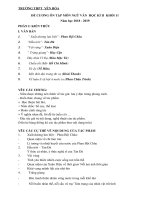Đề cương ôn tập học kì 2 môn Tiếng Anh lớp 10 năm 2019-2020 - Trường THPT Yên Hòa
Bạn đang xem bản rút gọn của tài liệu. Xem và tải ngay bản đầy đủ của tài liệu tại đây (752.58 KB, 14 trang )
YEN HOA HIGH SCHOOL
IN PREPARATION FOR THE SECOND TERM TEST
SCHOOL YEAR: 2019 – 2020
ENGLISH 10
NAME: _________________________
CLASS: _________________________
PART A: CONTENT (FROM UNIT 6 TO UNIT 10)
THEMES
LANGUAGE FOCUS
Unit 6: Gender equality
Unit 7: Cultural diversity
Unit 8: New ways to learn
Unit 9: Preserving the
environment
Unit 10: Ecotourism
Passive voice
Comparative and superlative
Articles: A/an/the
Relative clauses
Reported Speech
Conditional sentences type 1 & 2
PART B: PRACTICE TESTS
PRACTICE TEST 1
Mark the letter A, B, C, or D to indicate the word whose underlined part differs from the
other three in pronunciation in each of the following questions.
1.
2.
3.
4.
5.
A. women
A. address
A. minimum
A. prevent
A. encourage
B. follow
B. allow
B. influence
B. education
B. contribute
C. concentrate
C. traffic
C. eliminate
C. dependent
C. delicious
D. project
D. rural
D. bias
D. eliminate
D. college
Mark the letter A, B, C, or D to indicate the word(s) CLOSEST in meaning to the
underlined word(s) in each of the following questions.
6. This year, more girls enrolled on courses in art and design.
A. avoided
B. inserted
C. erased
D. enlisted
7. In some rural areas, women and girls are forced to do most of the housework.
A. invited
B. encourage
C. made
D. contributed
Mark the letter A, B, C, or D to indicate the word(s) OPPOSITE in meaning to the underlined
word(s) in each of the following questions.
8. The gender gap in primary education has been eliminated.
A. variety
B. inconsistency
C. difference
D. similarity
9. The United Kingdom has made a remarkable progress in gender equality.
A. insignificant
B. impressive
C. notable
D. famous
Mark the letter A, B, C, or D to indicate the underlined part that needs correction in each of
the following questions.
10. A lot of people think that marriage women shouldn’t pursue a career.
A
B
C
D
1
11. We must stop discrimination on people coming from the rural area.
A
B
C
D
12. My brother is good with cooking and he can cook very delicious food.
A
B
C
D
13. I guess they may be kept home doing housework and look after their children.
A
B
C
D
14. Women in rural areas might be forced to work both at home but on the fields.
A
B
C
D
15. Some people think that girls shouldn’t be allowed to going to university.
A
B
C
D
Mark the letter A, B, C, or D to indicate the correct answer to each of the following questions.
16. It is important that men should share household tasks _____________ their wives.
A. to
B. with
C. for
D. against
17. Women are more hard-working than men although they are physically _____________
weaker.
A. more
B. as
C. so
D. Ø
18. Women are likely to become trouble-makers _____________ they are too talkative.
A. in order to
B. so
C. because
D. thus
19. Gender discrimination must _____________ in order to create a better society.
A. eliminate
B. be eliminating
C. be eliminated
D. eliminated
20. This company can _____________ for wage discrimination among workers of different
genders.
A. be sued
B. be suing
C. sue
D. sued
21. Poor women in disadvantaged areas should _____________ more help by government.
A. offer
B. be offered
C. be offering
D. offered
22. Married women should be encouraged _____________ a career of their preference.
A. pursued
B. pursue
C. to pursue
D. from pursuing
23. Domestic violence _____________ women and girls must be wiped out at any cost.
A. on
B. at
C. for
D. against
24. Having good education enables women _____________ equality.
A. to achieve
B. achieve
C. to achieving
D. achieved
25. We all need to cooperate to fight _____________ racism and gender discrimination.
A. for
B. against
C. in
D. about
Read the following passage and mark the letter A, B, C, or D to indicate the correct answer
to each of the questions.
For Catherine Lumby, deciding to take on role of breadwinner in her relationship was not a difficult
choice. When she discovered she was pregnant with her first child, she had just been offered a
demanding new role as Director of the Media and Communications department at the University
of Sydney. But she didn’t see this as an obstacle, and was prepared to use childcare when the
children were old enough. It came, therefore, as a surprise to Lumby and her husband Derek that,
after the birth of their son, they couldn’t actually bear the thought of putting him into childcare for
nine hours a day. As she was the one with the secure job, the role of primary care-giver fell to
Derek, who was writing scripts for television. This arrangement continued for the next four years,
with Derek working from home and caring for both of their sons. He returned to full-time work
earlier this year.
Whilst Lumby and her husband are by no means the only Australians making such a role reversal,
research suggest that they are in the minority. In a government-funded survey in 2001, only 5.5
2
percent of couples in the 30-54 year age group saw the women working either part-or full-time
while the men were unemployed.
The situation is likely to change, according to the CEO of Relationships Australian, Anne
Hollonds. She suggests that this is due to several reasons, including the number of highly educated
women in the workforce and changing social patterns and expectations. However, she warns that
for couples involved in role-switching, there are many potential difficulties to be overcome. For
men whose self-esteem is connected to their jobs and the income it provides to the family, a major
change of thinking is required. It also requires women to reassess, particularly with regard to
domestic or child-rearing decisions, and they may have to learn to deal with the guilt of not always
being there at key times for their children. Being aware of these issues can make operating in nontraditional roles a lot easier.
(Source: Adapted from IELTS Express – Intermediate)
26. What is the main idea of the passage?
A. Men being the breadwinners.
B. Traditional roles of women.
C. Women being the home makers.
D. Reversed roles between men and women.
27. Catherine and her husband decided that Catherine would be the primary earner because
____________.
A. she had a badly paid job
B. she was not good at childcare
C. she had a reliable job
D. she wanted her husband to stay at home
28. In paragraph 1, the word ‘’him’’ refers to___________.
A. their son
B. her husband
C. Derek
D. her colleague
29. They decided that Derek would look after their son because they ___________.
A. couldn’t afford to put their child in care for long periods each day
B. didn’t want to put their child in care for long periods each day
C. thought childcare was not safe enough for their children
D. worried about their son’s health problem
30. In paragraph 2, the word ‘’reversal’’ is closest in meaning to___________.
A. stability
B. modification
C. rehearsal
D. switch
PRACTICE TEST 2
Mark the letter A, B, C, or D to indicate the word that differs from the other three in the
position of the primary stress in each of the following questions.
1.
2.
3.
4.
5.
A. increase
A. happy
A. couple
A. export
A. contrast
B. engage
B. perfect
B. promise
B. decrease
B. object
C. prepare
C. formal
C. import
C. present
C. rebel
D. propose
D. married
D. wedding
D. belief
D. support
Mark the letter A, B, C, or D to indicate the correct answer to each of the following questions.
3
6. Traditionally, most Vietnamese people never __________ the floor during the first three days
of the New Year.
A. sweep
B. paint
C. polish
D. resurface
7. The British usually pay a lot of __________ to good table manners and are expected to use
knives, forks and spoons properly.
A. money
B. care
C. attention
D. compliment
8. In the U.S children can choose their own partners even if their parents object __________ their
choice.
A. to
B. for
C. against
D. with
9. In the U.K 18-year-olds tend receive a silver key as a present to __________ their entry into
the adult world.
A. symbol
B. symbolic
C. symbolize
D. symbolist
10. In Australia, on Mother’s Day, the second Sunday in May, children prepare and __________
their mothers ‘breakfast in bed’
A. cook
B. serve
C. display
D. present
Mark the letter A, B, C, or D to indicate the word(s) CLOSEST in meaning to the underlined
word(s) in each of the following questions.
11. Mary is planning to tie the knot with her German boyfriend next June.
A. get married
B. say goodbye
C. get together D. fall in love
12. In some Asian countries like Viet Nam or China, money is given to the newly-married couple
as a wedding present.
A. gift
B. donation
C. souvenir
D. contribution
Mark the letter A, B, C, or D to indicate the word(s) OPPOSITE in meaning to the underlined
word(s) in each of the following questions.
13. Being practical, Americans avoid taking jobs which are beyond their ability.
A. out of
B. far from
C. within
D. inside
14. In many countries, it is customary for the bride to throw her bouquet of flowers into a crowd
of well-wishers.
A. uncommon
B. inadvisable
C. usual
D. normal
Mark the letter A, B, C, or D to indicate the correct answer to each of the following questions.
15. These days, in India, there are ___________ married couples who live on their own than
before.
A. more
B. many
C. less
D. little
16. In some countries in the Middle East, people stand ___________ to each other than those in
North America in a conversation.
A. most closely
B. more closely
C. closer
D. closest
17. Wedding ceremonies are ___________ now than they used to be in the part.
A. less complicated
B. the most complicated
C. as complicated
D. the least complicated
18. It’s much ___________ to celebrate a small and cozy wedding to save money.
A. best
B. better
C. the best
D. the better
19. In some Asian families, parents tend to have far ___________ control over their children than
those in some American families.
A. the most
B. the more
C. more
D. most
20. This is ___________ wedding party I’ve ever attended.
A. the more memorable
B. more memorable
4
C. the most memorable
D. most memorable
21. The more polite you appear to be, ___________your partner will be.
A. the happiest
B. the happier
C. the most happily
D. the more happily
22. Of the two bridesmaids, Lisa turned out to be ___________.
A. the most charming
B. the least charming
C. more charming
D. the more charming
23. The Korean are ___________ than the American in addressing their bosses.
A. more formal
B. much formal
C. most formal
D. the most formal
24. People in ___________ Western countries are often surprised to learn that ___________
Japanese celebrate Christmas.
A. Ø- Ø
B. the – the
C. the – Ø
D. Ø – the
25. In Japan, ___________ most important holiday of ___________season is New Year’s Day,
which comes one week after Christmas..
A. the- the
B. Ø – the
C. the – Ø
D. the – a
Mark the letter A, B, C, or D to indicate the correct response to each of the following
exchanges.
26. A: ‘’Have you heard? Martin and Lisa have just got engaged!’’
B: ‘’___________’’
A. Really? That’s fantastic!
B. Congratulations!
C. Let’s celebrate!
D. Good luck!
27. A: ‘’Well, Brad Pitt and Angelina Jolie have just decided to divorce! Don’t you know?
B: ‘’___________’’
A. I couldn’t agree more.
B. Oh, thanks!
C. Really? Are you kidding?
D. No. not right now.
Mark the letter A, B, C or D to indicate the sentence that is closest in meaning to each of the
following questions.
28. Nothing is more precious than happiness and health.
A. Happiness and health are the most precious things.
B. Happiness is more precious than health.
C. Health is more precious than happiness.
D. Happiness and health are more and more precious.
29. I’ve never seen such a nice bouquet of wedding flowers.
A. This bouquet of wedding flowers is the nicest that I’ve ever made.
B. This is the nicest bouquet of wedding flowers that I’ve ever seen.
C. I’ve never seen the nicest bouquet of wedding flowers so far.
D. Nothing I’ve seen is nicer than this bouquet of wedding flowers.
5
30. Ice-hockey is one of the most popular sports in Russia.
A. In Russia, ice-hockey is more popular than any other sports.
B. In Russia, no sport is more popular than ice-hockey.
C. In Russia, no sport is less popular than ice-hockey.
D. In Russia, one of the most popular sports is ice-hockey.
PRACTICE TEST 3
Choose the word which has the underlined part pronounced differently from the rest.
1. A. computer
B. turn
C. miraculous
D. accuracy
2. A. calculation
B. passion
C. question
D. mention
3. A. software
B. welfare
C. share
D. are
4. A. look
B. tooth
C. school
D. afternoon
5. A. put
B. full
C. fun
D. could
Mark the letter A, B, C or D to indicate the correct answer to each of the following
questions.
6. Personal____ devices are useful for learning.
A. electric
B. electrical
C. electronic
D. Electronical
7. They’re excellent learning ___. You can store information, take notes, write essays and do
calculation.
A. equipments
B. tools
C. gadgets
D. techniques
8. In English class yesterday, we had a discussion _____ different cultures.
A. around
B. about
C. for
D. from
9. Mrs Dawson said that we were ______ our lesson in the library next Monday.
A. having
B. making
C. reading
D. going
10. I really don’t ____ the point of taking the exam when you are not ready for it
A. take
B. have
C. mind
D. see
Mark the letter A, B, C or D to indicate the correct answer to each of the following
questions.
11. “Who’s that over there?”-“Oh, it’s our new teacher, ____ just started work today.”
A. that
B. who he
C. which he
D. who
12. “Which CD did you get Marcus in the end?” –“I got him the one ____ said he really wanted
to hear.”
A. that
B. who he
C. whose
D. which he
13. “Who did you send a Valentine’s card to?” – “I’m not telling you, but it was someone _____
name begins with “B”.”
A. which
B. who her
C. whose
D. whose her
14. “Have you been Jason Green’s latest film?” – “Is that the one in ____ joins the FBI?”
A. which he B. that he
C. whom he
D. which
6
15. “Why do you like Tania so much?” – “Well, she’s one of the few people to ____ I can really
talk.”
A. which
B. whom
C. that
D. who
16. “Why don’t we go to Lionel’s for dinner tonight?” – “Is that the new restaurant _____ has
just opened on the other side of town?”
A. which
B. where
C. that it
D. which it
17. “Could you lend me some money?” – “I’d like you to give me one good reason ____ I
should.”
A. that
B. which
C. why
D. who
18. “What do you want to do this summer?” – “I think we should go somewhere ____ has plenty
of sun and sand.”
A. who
B. where
C. when
D. that
19. Smartphones, laptop and tables are the modern devices _____have changed the way we think
A. what
B.
C. whose
D. that
20. Students use smartphones to record their phone calls, ____ they later share with the class.
A.
B. that
C. which
D. whose
Read the following passage and mark the letter A, B, C or D to indicate the correct word
that best fits each of the numbered blanks.
A POWERFUL INFLUENCE
There can be no doubt at all that the Internet has made a huge difference to our lives. Parents are
worried that children spend too much time playing on Internet, hardly (21)____ doing anything
else in their spare time. Naturally, parents are curious to find out why the Internet is so attractive,
and they want to know if it can be (22)____ for their children. Should parents be worried if their
children are spending that much time (23)___ their computers?
Obviously, if the children are bent over their computers for hours, absorbed in some game,
instead of doing their homework, then something is wrong. Parents and children could decide
how much use the child should make of the Internet, and the child should give his or her word
that it won’t interfere with homework. If the child is not (24)____ to this arrangement, parents
can take more drastic (25)____. Dealing with a child’s use of the Internet is not much different
from (26)____ any other sort of bargain about behavior.
Any parent who is seriously alarmed about a child’s behavior should make an appointment to
(27)____ the matter with a teacher. Spending time in front of the screen does not necessarily.
Affect a child’s performance at school. Even if the child is (28)____ crazy about using the
Internet, he or she is probably just going through a phase, and in a few months there will be
something else to worry about!
21. A. always
22. A. harming
23. A. staring at
24. A. holding
25. A. rules
26. A. dealing
27. A. speak
28. A. absolutely
B. rarely
B. harmful
B. glancing at
B. sticking
B. procedures
B. negotiating
B. discuss
B. more
7
C. never
C. hurting
C. looking
C. following
C. regulations
C. having
C. talk
C. quite
D. ever
D. hurtful
D. watching
D. accepting
D. steps
D. arranging
D. debate
D. a lot
Mark the letter A, B, C or D to indicate the sentence that best combines each pair of sentences
in the following questions
29. Electronic dictionaries are now commen in English classes. They can be very easily
downloaded into your personal electronic device.
A. Electronic dictionaries which can be very easily downloaded into your personal
electronic device are now common in English classes.
B. Electronic dictionaries, which can be very easily downloaded into your personal
electronic device, are now common in English classes.
C. Electronic dictionaries, that can be very easily downloaded into your personal
electronic device, are now common in English classes.
D. Electronic dictionaries can be very easily downloaded into your personal electronic
device are now common in English classes
30. Electronic devices are bad for your eyes. Their radiation is very harmful.
A. Electronic devices that their radiation is very harmful are bad for your eyes
B. Electronic devices which their radiation is very harmful are bad for your eyes
C. Electronic devices, whose their radiation is very harmful, are bad for your eyes
D. Electronic devices whose their radiation is very harmful are bad for your eye
PRACTICE TEST 4
Mark the letter A, B, C or D to indicate the word that differs from the other three in the
position of the primary stress in each of the following questions.
1.
2.
3.
4.
5.
A. vehicle
A. consumption
A. scientist
A. erosion
A. volunteer
B. musical
B. chemical
B. consequence
B. atmosphere
B. charity
C. article
C. neighborhood
C. detergent
C. resources
C. vegetable
D. reduction
D. pesticide
D. influence
D. confusion
D. injury
Mark the letter A, B, C, or D to indicate the correct answer to each of the following
questions.
6. During the last hundred years we have done great __________ to the environment.
A. injury
B. pollution
C. damage
D. hurt
7. There are lots of things we can all do to __________ the environment.
A. Enhance
B. protect
C. make
D. build
8. Environmentalists are furious with the American Government for delaying measures
which will reduce greenhouse gas __________.
A. exhaust fumes
B. smokes
C. wastes
D. emissions
9. Farmers contribute to environmental damage by spraying __________ with __________,
which stay in the soil for years.
A. agriculture – pesticide
B. agriculture – fertilizers
C. crops – fertilizers
D. crops – pesticides
10. However, some scientists argue that the historical evidence shows that over time the
Earth heats __________ and cools __________ naturally.
A. up – away
B. away – down
C. up – down
D. down – up
11. ‘’Don’t waste water,’’ Mum said to Mary.
Mum told Mary____________.
A. that she doesn’t waste water
C. to waste water
8
B. don’t waste water
D. not to waste water
12. ‘’You shouldn’t use your cars for short distances,’’ the teacher said.
The teacher advise her students____________.
A. that you shouldn’t use your cars for short distances
B. not to use their cars for short distances
C. not to use your cars for short distances
D. not to use her cars for short distances
13. ‘’I’ll finish it by the end of this week,’’ he said.
He promised____________.
A. he’ll finish it by the end of this week
B. he would finish it by the end of this week
C. to finish it by the end of that week
D. to finish it by the end of this week
14. ‘’Don’t forget to turn the tap off before you leave,’’ Grandma said.
Grandma reminded me ____________.
A. to turn the tap off before I left
B. turn the tap off before you left
C. don’t forget to turn the tap off before I left
D. to turn the tap off before you left
15. Dorothy asked him ____________ Sarah was his sister.
A. that
B. if
C. what
D. who
Mark the letter A, B, C, or D to indicate the word(s) CLOSEST in meaning to the underlined
word(s) in each of the following questions.
16. We are facing severe environmental pollution despite the fact that many world
organizations are working hard to reduce it.
A. heavy
B. destructive
C. harmful
D. serious
17. Water pollution is a result of dumping pollutants such as detergents, pesticides, oil, and
other chemicals in rivers, which makes the water unclean.
A. substances B. stuffs
C. contaminants
D. wastes
Mark the letter A, B, C, or D to indicate the correct respond to each of the following
exchanges.
18. ‘’Why don’t we have a look at some websites for more information about the
environment?’’ – ‘’_________'’
A. Yes, thanks.
B. Yes, why not?
C. It’s my pleasure.
D. Do
we?
19. ‘’_________'’ – ‘’By bus.’’
A. What did you take to get there?
B. Did you get there by motorbike?
C. How long did it take you to get there?
D. How did you get there?
20. ‘’Hi, Jack. ___________’’ – ‘’Not bad. And you?’’
A. How’s everything?
B. What’s everything?
C. What do you do?
D. How do you do?
Read the following passage and mark the letter A, B, C, or D to indicate the correct answer
to each of the questions.
THINK BEFORE YOU TOSS
Countries around the world have growing mountains of trash because people are throwing out
more trash than ever before. How did we become a throwaway society?
9
First of all, it is now easier to replace an item than to spend time and money to repair it. Thanks to
modern manufacturing and technology, companies are able to produce items quickly and
inexpensively. Products are plentiful and prices are low, so we would rather buy something new
than repair it. Even if we did want to repair something, many items are almost impossible to repair.
These products contain many tiny, complicated parts. Some even contain small computer chips.
It’s easier to throw these items away and buy new ones than to fix them.
Another contributing factor is our love of disposable products. As busy people, we are always
looking for ways to save time and make our lives easier. Why should we use cloth kitchen towels?
It’s easier to use paper towel once and toss it out. Companies manufacture thousands of different
kinds of disposable items: paper plates, plastic cups, cameras, and razons for shaving, to name a
few. The problem is that disposable products also contribute to our trash problem.
Our appetite for new products also contributes to the problem. We are addicted to buying new
things. As consumers, we want the latest clothes, the best TVs, and cellphones with the newest
features. Companies tell us to buy, buy and buy. Advertisements persuade us that newer is better.
The result is that we throw away useful possessions to make room for new ones.
(Source: ‘’Think before you Toss’’ in Q-skills for Success- Reading and Writing 2)
21. Which of the following is NOT a reason for people to replace a broken item?
A. Products are now mass produced at affordable prices.
B. It takes almost no time to fix broken items.
C. Many items are too complicated to repair.
D. Some products contain tiny, complicated chips.
22. All of the following are disposable products, EXCEPT________.
A. cloth kitchen towels
B. paper plates
C. plastic cups
D. razors for shaving
23. The word ‘’disposable’’ in paragraph 3 is closest in meaning to ________.
A. convenient
B. inexpensive
C. throwaway
D. single-use
24. Why are we hooked on buying new things?
A. We throw the old items to make room for the new ones.
B. We have more money than ever before.
C. We want to own as many things as possible.
D. We are made to believe that the new is the better.
25. The word ‘’appetite’’ in the last paragraph can be best replaced by ________.
A. need
B. demand
C. desire
D. taste
Mark the letter A, B, C or D to indicate the sentence that is closest in meaning to each of the
following questions.
26. ‘’We saw a strange man in the garden,’’ they told their son.
10
A. They told their son that we had seen a strange man in the garden.
B. They told their son that they had seen a strange man in the garden.
C. They told their son that we saw a strange man in the garden.
D. They told their son that they saw a strange man in the garden.
27. ‘’We’re staying in tonight,’’ said Emily.
A. Emily said that we were staying in tonight.
B. Emily said that they were staying in tonight.
C. Emily said that we were staying in that night.
D. Emily said that they were staying in that night.
28. ‘’I’ve bought a ring,’’ he said to his girlfriend.
A. He said his girlfriend that he had bought a ring.
B. He said his girlfriend that he bought a ring.
C. He told his girlfriend that he had bought a ring.
D. He told his girlfriend that he bought a ring.
29. ‘’We went to work yesterday,’’ she said.
A. She said that they had been to work the day before.
B. She told that they had been to work the day before.
C. She said that they had been to work the following day.
D. She said that she had been to work the day before.
30. ‘’Don’t swim out too far, boys,’’ he said
A. He encouraged the boys not to swim out too far.
B. He advised the boys not to swim out too far.
C. He warned the boys not to swim out too far.
D. He threatened the boys not to swim out too far,
PRACTICE TEST 5
I. Change the following sentences into Passive Voice
1. They opened the road 10 years ago.
__________________________________________________________
2. He can mend all chairs for you now.
__________________________________________________________
3. They must widen the road to school this year.
__________________________________________________________
4. Have you done your homework?
__________________________________________________________
11
5. Who will Ann meet at the airport?
__________________________________________________________
6. The Prime Minister is making a speech at the moment.
__________________________________________________________
7. He had the neighbor mend the chair.
__________________________________________________________
8. We see her walk with him every evening.
__________________________________________________________
9. You needn’t water the flowers.
__________________________________________________________
10. They had finished the preparations by the time the guests arrived.
__________________________________________________________
II. Combine the following sentences by using Relative Clause. Use commas for non-defining
relative clauses.
1. I remember the day. I was afraid to use my new computer then
__________________________________________________________
2. I work in an office. In my office, the software changes frequently.
__________________________________________________________
3. The secretary can give you the information. She sits at the first desk on the right.
__________________________________________________________
4. The Southam Chess Club meets weekly on Friday evenings. It has more than 50 members.
__________________________________________________________
5. Professor Johnson is to visit the university next week. I have long admired him.
__________________________________________________________
6. The playground wasn't used by those children. It was built for those children.
__________________________________________________________
7. People often suffer from backache. Their work involves standing for most of the day.
__________________________________________________________
8. They climbed up to the top of a large rock. They got a good view from there.
__________________________________________________________
9. A doctor has had to retire through ill health. We know him.
__________________________________________________________
10. Jane has sold the old car. She was given it by her father.
III. Change the following sentences into reported speech.
1. “We went out last night”, he told me.
__________________________________________________________
12
2.
“I was waiting for the bus when they arrived”, he told me.
__________________________________________________________
3.
“I’ve never been here before”, he said.
__________________________________________________________
4.
“Lucy will come later”, he said.
__________________________________________________________
5. “Can you help me?” he asked me.
__________________________________________________________
6. “Who do you want to talk to now, Mary?”, the boy said.
__________________________________________________________
7. "Close the door behind you.", said he.
__________________________________________________________
8. “I won’t help you with your homework. Never!”, Jane said to me.
__________________________________________________________
9. Mr. Gray said to the children, “Don’t play in the street.”
__________________________________________________________
10. “Sure, I don’t mind at all if you use my typewriter. Go ahead.” he said (allow)
__________________________________________________________
IV. Complete each of the following sentences using IF
1. Go right now or you’ll be late for the train.
__________________________________________________________
2. Because you speak English unnaturally, they do not understand you.
__________________________________________________________
3. Because Simon doesn’t live near his mother, he can’t visit her often.
__________________________________________________________
4. The weather is so hot that we can’t go out.
__________________________________________________________
5. Stop talking or you won’t finish the work on time.
__________________________________________________________
6. He doesn’t apply for the job because he doesn’t have enough qualifications.
__________________________________________________________
7. We can’t buy this car because it is very expensive.
__________________________________________________________
8. Rita is exhausted today because she didn’t get any sleep last night.
__________________________________________________________
V. Complete the sentences with the correct form of the words in brackets.
13
1. _________________ is destroying large areas of tropical rain forest. (DEFOREST)
2. Vitamin C may help _________________ against cancer. (PROTECTION)
3. This car _________________ lots of fuel each year. (CONSUMPTION)
4. Life expectancy in Europe has _________________greatly in the 20th century. (INCREASE)
5. The water supply is being tested for _________________. (CONTAMINATE)
6. A documentary is a film with _________________ information, often about a problem in
society.
(FACT)
7. As a home _________________, television rapidly became more popular than any other
forms.
(ENTERTAIN)
8. _________________, the excursion turned out to be a disaster. (FORTUNATE)
9. Wilson and Thomas were American _________________ who stood for equal educational
rights for women. (EDUCATE)
10. If the computer doesn’t work, turn it off and _________________ it. (START)
VI. Complete the conditional sentences, using Type I or II.
1.
2.
3.
4.
If you do your homework now, we (go) _________________to the cinema in the evening.
If we (order) _________________ the book now, we will have it tomorrow.
If I had more money, I (buy) _________________a bigger car.
If I (meet) _________________ my favorite movie star, I would ask him for an autograph.
5. I (call) _________________you if I need your help.
6. I would go swimming if the weather (be) _________________ better.
7. If he (have) _________________ time tomorrow, we will meet each other.
8. If I were you, I (know) _________________what to do.
9. If we don't order the tickets soon, there (not be) _________________any tickets left.
10. She (say) _________________that if she were your friend.
11. If they go to Washington, they (see) _________________the White House.
12. If she (have) _________________ a hamster, she would call him Fred.
13. If he gave her a sweet, she (stop) _________________crying.
14. If he (arrive) _________________ later, he will take a taxi.
15. We would understand him if he (speak) _________________ slowly.
16. Andy (cook) _________________dinner if we buy the food.
17. I will prepare breakfast if I _________________ (wake up) early.
18. If they shared a room, they (fight) _________________all day long.
19. If you hate walking in the mountains, you (enjoy / not) _________________the tour.
20. Janet would go jogging if she (have / not) _________________to do her homework.
THE END
14
